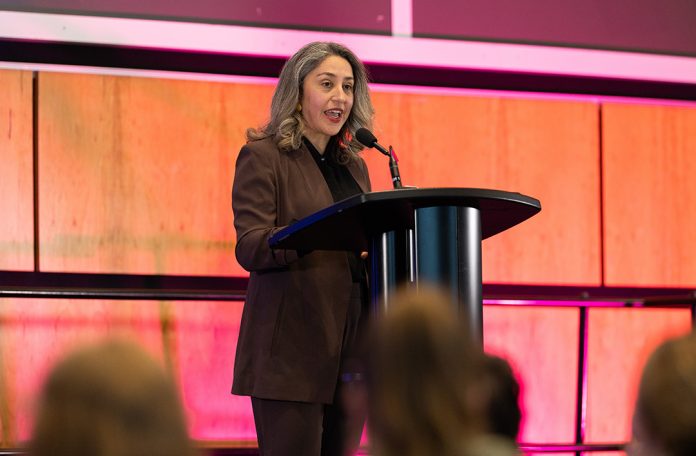“Everything you do is worth something… It’s setting you up for something else, it’s teaching you something, even if it’s a failure,” said journalist, educator and scholar, Gabriela Perdomo.
Being born and raised in Bogotá, Colombia, and leaving her home country alone for education in Canada at the age of 23, Perdomo’s path took many turns.
She had a happy childhood and a tightly knit family with her parents, two sisters, 15 cousins and four dogs. Most weekends were spent at their little cottage in the mountains where the dogs would sleep outside and the booming of the big city was muted.
Behind the scenery of her beautiful country, several people they knew had been kidnapped and when Perdomo was 15, her family decided it was not safe for them to go back to their mountain cottage.
Perdomo said the question of safety and security was always an issue. “They remain an issue,” said Perdomo.
Her parents wanted her to seek better opportunities and build a life elsewhere for these reasons.
Perdomo was determined to practice journalism but wanted to study something else in Columbia first.
She thought “part of the appeal of journalism was that it kind of always allows you to keep your doors a little bit open.”
At the time, there were no journalism programs in Columbia so the decision was between literature or law. She always had doubts about law but after getting accepted into both, she realized she had no interest in studying law.
She ultimately chose literature and attended the Universidad de Los Andes from 1998 to 2003.
This decision was not without deliberation.
Perdomo’s “larger than life” neighbour was an important figure. He said it is better to have the journalistic skills but go deep into something else.
So that is what she did.
After a great four years studying literature, she was ready for education elsewhere, but this did not go as planned.
Applying to schools in the U.S. proved difficult as it was close to when 911 and funding was frozen making it unaffordable.
This gave Perdomo the opportunity to work as a journalist in Columbia.
Although she wanted to write and work in print, she knew someone in broadcasting. As a result, Perdomo’s first job was working as a producer for a reality show in broadcasting.
Even though broadcasting was not her initial interest, she still misses it today. Perdomo loved working in TV, but most of all, working with the camera people. They were the ones who coached her through interviews and taught her most of what she knows.
“The most interesting people I’ve ever met in my life are the camera people.”
After going on to another broadcasting job with some nerve-wracking on-air moments, Perdomo moved to Canada alone and went back to school at the University of British Columbia (UBC) for a masters degree in journalism.
“I don’t think I ever realized how hard it would be to try and make it as a journalist, as an immigrant,” said Perdomo.
By the time she graduated from UBC, she was not a citizen or resident, which limited opportunities.
“I could have just gone back to Columbia and my job,” she said, “but I wanted to keep exploring and make my life here.”
It was not until her fellowship at The Tyee in Vancouver that she began to understand the kind of journalism she wanted to do.
At The Tyee, Perdomo reported on the flower trade in Ecuador and Columbia for three months after working in market research, which she did not enjoy.
She loved the opportunity to put boots to the ground, do research and tell a story.
Magda Konieczna, who organized an engaged journalism conference with Perdomo this past summer, said “she’s very connected into, sort of, the academic side of journalism in Canada.”
Although Perdomo ended up going back to market research for a stable paycheck, she landed an internship at Macleans where she ended up doing one of her favourite things she has done as a journalist.
She was thrown into writing obituaries.
Perdomo said “getting to interview people who are fresh in their grief, but opening a space for them to tell you their loved one’s story is probably one of the best gifts that you can have.”
This taught her how to treat sources with respect and humility.
“She makes others feel heard and valued,” said Catalina Blair who worked with Gabriela at the Columbian Trade Commission in Toronto.
Perdomo’s hope is that we never forget that we talk to each other not to trick each other, but “we talk to each other because we want to connect.”
Everything she does is with the aspirations of advancing fair journalism.
Perdomo always says, “Journalism is like water. It always finds a way.”




